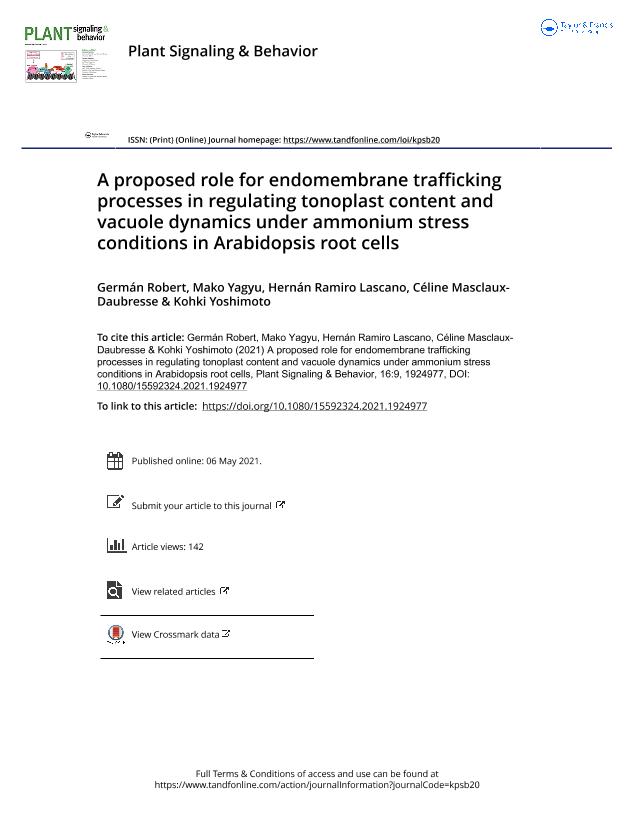Artículo
A proposed role for endomembrane trafficking processes in regulating tonoplast content and vacuole dynamics under ammonium stress conditions in Arabidopsis root cells
Fecha de publicación:
05/2021
Editorial:
Taylor & Francis
Revista:
Plant Signaling and Behavior
ISSN:
1559-2324
Idioma:
Inglés
Tipo de recurso:
Artículo publicado
Clasificación temática:
Resumen
Ammonium (NH4+) stress has multiple effects on plant physiology, therefore, plant responses are complex, and multiple mechanisms are involved in NH4+ sensitivity and tolerance in plants. Root growth inhibition is an important quantitative readout of the effects of NH4+ stress on plant physiology, and cell elongation appear as the principal growth inhibition target. We recently proposed autophagy as a relevant physiological mechanisms underlying NH4+ sensitivity response in Arabidopsis. In a brief overview, the impaired macro-autophagic flux observed under NH4+ stress conditions has a detrimental impact on the cellular energetic balance, and therefore on the energy-demanding plant growth. In contrast to its inhibitory effect on the autophagosomes flux to vacuole, NH4+ toxicity induced a micro-autophagy-like process. Consistent with the reduced membrane flux to the vacuole related to macro-autophagy inhibition and the increased tonoplast degradation due to enhanced micro-autophagy, the vacuoles of the root cells of the NH4+-stressed plants showed lower tonoplast content and a decreased perimeter/area ratio. As the endosome-to-vacuole trafficking is another important process that contributes to membrane flux toward the vacuole, we evaluated the effects of NH4+ stress on this process. This allows us to propose that autophagy could contribute to vacuole development as well as possible avenues to follow for future studies.
Archivos asociados
Licencia
Identificadores
Colecciones
Articulos (UDEA)
Articulos de UNIDAD DE ESTUDIOS AGROPECUARIOS
Articulos de UNIDAD DE ESTUDIOS AGROPECUARIOS
Citación
Robert, Germán; Yagyu, Mako; Lascano, Hernan Ramiro; Masclaux-daubresse, Céline; Yoshimoto, Kohki; A proposed role for endomembrane trafficking processes in regulating tonoplast content and vacuole dynamics under ammonium stress conditions in Arabidopsis root cells; Taylor & Francis; Plant Signaling and Behavior; 16; 9; 5-2021; 1-5
Compartir
Altmétricas




